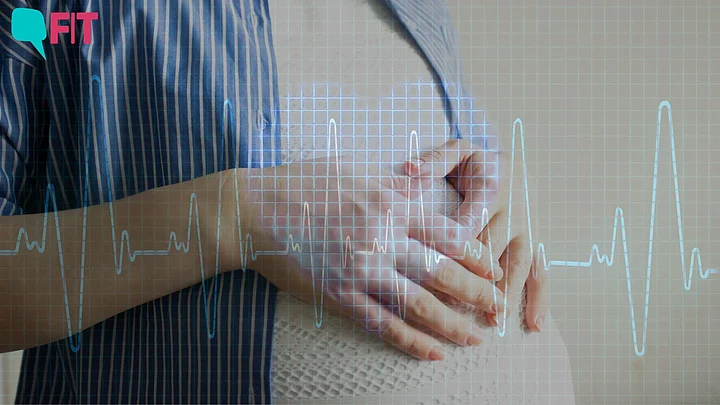The sudden death of Malayalam TV serial actor Dr Priya last week on Wednesday, 1 November, after suffering a fatal cardiac arrest sent shockwaves through the state. The 35-year-old was eight months pregnant at the time of her passing. The baby, born prematurely, is currently in the intensive care unit, according to local reports.
The grim news once again brings to the forefront the worrying rise in heart attacks among young people, particularly women.
Where once young, premenopausal women were thought to be 'protected' against cardiovascular disorders, mounting data in recent years points to a rise in heart attacks and cardiac arrests among young women.
Is this risk amplified during pregnancy? What can pregnant people do to minimise the risk of heart issues during pregnancy? FIT answers your FAQs.
Does the risk of heart attacks go up during pregnancy?
Certain biological changes and preexisting conditions can increase the risk of heart damage during pregnancy.
Speaking to FIT, Dr Aparna Jaswal, Director, Electrophysiology and Cardiac Pacing, Fortis Escorts Heart Institute, Okhla, New Delhi, explained, "Pregnancy is a hypercoagulability (increased tendency of blood to thrombose) state, because of which many heart-related issues, including the risk of heart attacks can increase."
"Pregnancy is a pro-inflamatory condition, which means during pregnancy the changes that take place in the body, the hormonal changes, the changes in blood pressure, changes in blood volume, blood sugar levels can all highten this risk."
Are some people more at risk than others?
Some studies have shown a higher risk of heart attacks in pregnant women over the age of 30.
A study conducted in 2018 found that 4,373 women out of 49 million had a heart attack during the course of their pregnancy, during labour and delivery, or after they gave birth.
75 percent of these women also happened to be over the age of 30.
While studies and surveys suggest heart attacks appear to be rising among pregnant women, doctors say the phenomenon could have more to do with the rise in other Non-Communicable Diseases (NCDs) that contribute to heart damage.
Moreover, Dr Mukesh Goel, a Delhi-based cardiovascular surgeon, says people with pregnancy-induced hypertension and pregnancy-induced diabetes are also vulnerable to heart damage during this period.
"If a person is already suffering with some pre-exising heart condition they need to be especially careful. Because during pregnancy the blood circulation increases many fold, it could worsen the condition."Dr Mukesh Goel
But aren't pre-menopausal women (below the age of 50) biologically protected against heart damage?
"Women are generally protected against heart damage because they have a protected hormone called estrogen. However, the protective effect of estrogen is offset by poor lifestyle choices and new lifestyle diseases that are on the rise even among women," says Dr Jaswal.
These risk factors, she goes on to say, include:
Diabetes
Hypertension
Smoking
Lack of physical activity
Genetic factors
How can you find out if you're at risk?
Dr Goel and Dr Jaswal, both underscore that many women may have preexisting heart issues that they are not aware of. For instance, one may have undiagnosed congenital heart conditions, or weakness of heart muscles.
This is why, they recommend getting tested for these conditions in addition to testing for hypertension and blood sugar.
Discuss it at length with your obstetrician. You may require an Echocardiogram (ECHO) and Electrocardiogram (EKG/ECG) tests if you're suspected to be at risk of heart damage, says Dr Jaswal.
How can pregnant people prevent the risk of heart attacks?
According to the experts we spoke to, these are some ways in which you can reduce the risk of heart damage during pregnancy.
Be mindful of your diet
Avoid transfats
Keep up with your obstratecian and regular checkups
Keep your blood sugar in check
Exercise regularly
"Often in India we see that women stop exercising and have a very unbalanced diet, this should be avoided because it puts them at a higher risk of developing heart disease."Dr Aparna Jaswal, Director, Electrophysiology and Cardiac Pacing, Fortis Escorts Heart Institute, Okhla, New Delhi

